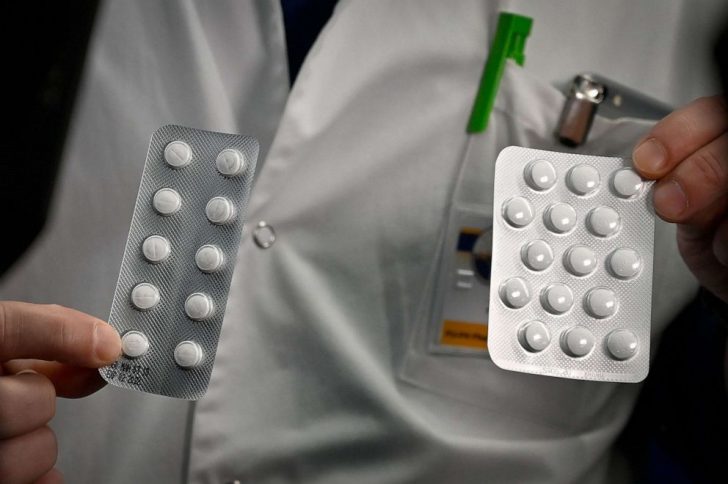The United States Government recently touted Hydroxychloroquine and Azithromycin as the potential magic-bullet treatment for the 2019 coronavirus disease (COVID-19). While Hydroxychloroquine is an anti-malarial drug, Azithromycin is an antibiotic.
In a tweet on Saturday, US President Donald Trump disclosed that these drugs if taken together was capable of curing persons infected with the virus.
He wrote, “HYDROXYCHLOROQUINE & AZITHROMYCIN, taken together, have a real chance to be one of the biggest game changers in the history of medicine. The FDA has moved mountains – Thank You! Hopefully they will BOTH (H works better with A, International Journal of Antimicrobial Agents) be put in use IMMEDIATELY. PEOPLE ARE DYING, MOVE FAST, and GOD BLESS EVERYONE!”
The president’s call for the drugs to be put to use “immediately” comes amid concerns from experts that the effectiveness of Hydroxychloroquine to cure the virus was in doubt.
Mr. Trump had first made the case for Hydroxychloroquine on Thursday.
But asked about whether the drug was a promising solution, Dr. Anthony Fauci, Director of the National Institute of Allergy and Infectious Diseases, told a White House news conference on Friday that the “the answer is no”.
He said that “the evidence you’re talking about … is anecdotal evidence”.
Another doctor, Dr. Eugune Gu backed Fauci.
Responding to Trump’s Saturday tweet, Gu wrote, “The combination of hydroxychloroquine and azithromycin to treat the coronavirus has not been proven safe and effective through large scale clinical trials.
“There is only anecdotal evidence from case reports in countries overseas. Promising them as miracle drugs gives false hope.”
However, a source with knowledge on the chemical composition of chloroquine said while it will not prevent coronavirus, it could slow down its process of multiplying.
He said, “Neither Chloroquine or Hydroxochloroquine (#Plaquenil) prevents #COVID19, but they do inhibit the virus from multiplying, reducing the symptoms.
“Another zinc ionophore that might be helpful is Quercetin which is available over the counter.”
Read Also: Coronavirus: 10 new cases recorded in Lagos, Abuja
According to Web MD, “Chloroquine is used to prevent or treat malaria caused by mosquito bites in countries where malaria is common. Malaria parasites can enter the body through these mosquito bites, and then live in body tissues such as red blood cells or the liver. This medication is used to kill the malaria parasites living inside red blood cells. In some cases, you may need to take a different medication (such as primaquine) to kill the malaria parasites living in other body tissues. Both drugs may be needed for a complete cure and to prevent the return of infection (relapse). Chloroquine belongs to a class of drugs known as antimalarials…
“Chloroquine is also used to treat infection caused by a different type of parasite (ameba) by killing the ameba.”
Researchers claim that it has a similar effect on the coronavirus.
On dosage for malaria treatment and prevention, it is important to follow the doctor’s instructions.
“Take this medication by mouth, usually with food to prevent stomach upset, exactly as directed by your doctor. Daily or weekly dosing, dosage amount, and length of treatment are based on your medical condition, on whether you are preventing or treating the illness, and your response to treatment. The dosage in children is also based on weight.
“To prevent malaria, take chloroquine once weekly on the same day each week, or as directed by your doctor. Start this medication usually 1 to 2 weeks before you enter the malarious area, continue to take it weekly while in the area, and weekly for 4 to 8 weeks after leaving the area, or as directed by your doctor. Mark your calendar or travel schedule with a reminder to help you remember.
“To treat malaria infection or an ameba infection, follow your doctor’s instructions.
“Take this medication 4 hours before or after taking a certain drug for diarrhea (kaolin) or taking antacids (such as magnesium/aluminum hydroxide). These products may bind with chloroquine, preventing your body from fully absorbing the drug.
“It is very important to continue taking this medication exactly as prescribed by your doctor. Do not take more or less of this drug than prescribed. Do not stop taking it before completing treatment, even if you feel better, unless directed to do so by your doctor. Skipping or changing your dose without approval from your doctor may cause prevention/treatment to be ineffective, cause the amount of parasite to increase, make the infection more difficult to treat (resistant), or worsen side effects.”
However, experts warn against taking an overdose of chloroquine, saying it could cause a host of side effects.
A Nigerian doctor, Dr. Chinonso Egemba aka Aproko Doctor, warned against overdosing on chloroquine, saying it could cause blindness, headache, drowsiness, slow heart rate, confusion, seizures/convulsion, unconsciousness and death.
Read Also: Lagos discharges Italian who brought coronavirus into Nigeria (Photos)



Leave a Reply